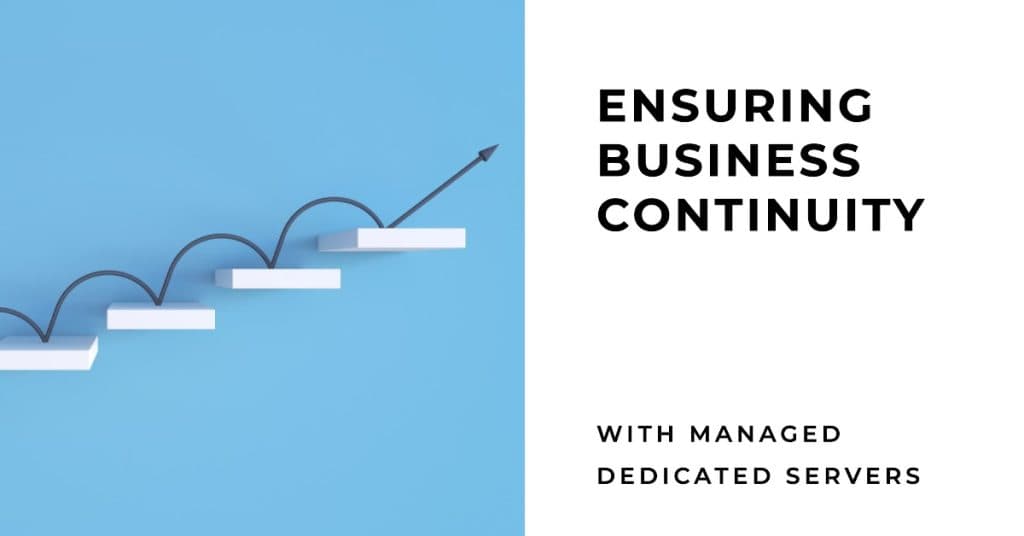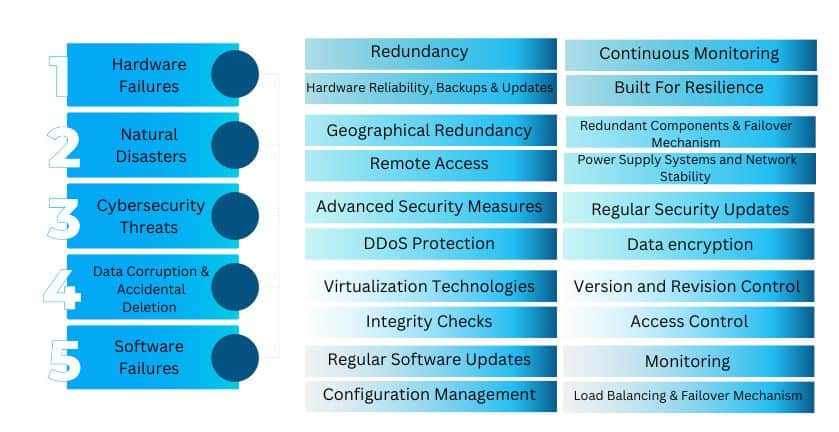
What are managed dedicated servers?
A managed dedicated servers offers premium quality hosting solutions for businesses for whom security, stability and performance are crucial. You get all the advantages of a dedicated server along with the complete and dedicated assistance from expert technical and customer support teams.
This means that the client who is using managed dedicated server hosting services, can run businesses with more efficiency. They can focus on other aspects of their businesses such as marketing and finances.
Why is it important for a business to plan its continuity?
Business continuity refers to an organization’s ability to keep its essential functions running even if it is hit by an unexpected disaster or a disruptive event.
In the case of a business website, its downtime can lead to significant revenue losses even if the duration of the downtime or the duration of the website’s disruption was not too long. It can also tarnish the reputation of the business, lead to customer dissatisfaction and cause issues in the overall online presence of the business.
This is why it is important that a business should have a well structured disaster recovery plan.
In this article, we will list out the different strategies that can be followed by a business to overcome unexpected disasters with the help of a managed dedicated server.
Before we get into that, let us briefly look at some of the common issues that can be solved with a managed dedicated server.
Common issues that disrupt business continuity
Hardware failures
When it comes to hardware components, there are always chances that they may fail unexpectedly. This could also happen when you are working on crucial projects. Such hardware failures cause data loss and disruptions in the services your business offers.
Natural disasters
Most natural disasters occur unexpectedly and there is usually nothing much you can do even when early warnings are announced. Earthquakes, floods, cyclones, wildfires, tsunamis and other types of natural disasters damage on- premise data centers. You could lose critical data and applications if they are not backed up remotely.
Cybersecurity threats
Your servers are always under cybersecurity threats like DDoS attacks, malware and ransomware. This means that all your critical and sensitive data is under the threat of unauthorized access leading to other bigger issues. It is best to take measures to avoid these issues by keeping your server and data secure right from the start.
Data corruption and accidental deletion
Your data can be corrupted or accidently deleted because of a variety of reasons. Some of the causes could be human error, software bugs or a system glitch. This can be avoided with the help of a managed dedicated server and its backup features.
Software failures
In case of software errors or misconfiguration the system will crash or there will be inconsistencies in data. This can be avoided by employing constant monitoring and quick technical support.
Now that you have an idea of common issues that can disrupt your business, let’s look at the various ways in which a managed dedicated server can help you overcome these problems and ensure business continuity.

How Managed Dedicated Servers Help with Business Continuity
1. Solving the issue of hardware failure
Redundancy
Managed dedicated servers offer redundant hardware configurations like RAID. It distributes data across multiple disks and provides data redundancy. It also increases consistently high performance. This helps in ensuring that your website does not lose any data, experience any downtime and your server will also continue to function properly.
Continuous Monitoring
Another advantage of a managed dedicated server hosting plan is that it offers continuous and thorough monitoring of your server’s hardware. This helps in detecting any possible issues early enough to stop it from causing any significant trouble. These plans take proactive steps to reduce the chances of hardware-related problems.
Hardware reliability, backups and updates
Managed dedicated servers use the most reliable hardware with well-planned backup measures that will ensure business continuity. In addition to that, regular hardware upgrades are performed to maintain server performance and its reliability. Regular updates also help in avoiding the risk of hardware failures that could occur because of outdated hardware.
Built for resilience
The data center where managed dedicated servers are housed, always have the most advanced infrastructure. They have redundant power supply, they have cooling systems in place to avoid overheating and many other facilities. Therefore, there are better chances of avoiding any issues related to hardware failure when you purchase a managed dedicated server hosting plan.
2. overcoming natural disasters
Geographical redundancy
One of the most helpful features of a fully managed dedicated server hosting plan is that the servers are located in secure data centers and these centers are often spread across different geographical locations. Due to this geographical redundancy, even if one data center is hit by a natural disaster, your business will continue to run smoothly because you can switch to a data center that is unaffected by the event.
Redundant Components & Failover Mechanism
High availability architecture is used to build managed dedicated servers. This means that there are redundant components and failover mechanisms are in place by default. In case your server is affected by a natural calamity, then the traffic can easily be redirected to other servers.
Remote Access
Managed dedicated servers allow remote access to data. If there is a situation where physical access to your office or one data center is not possible, then you can access all information using the remote access feature. This is another way in which a managed dedicated server helps you ensure the continuity of your business.
Power Supply Systems and Network Stability
Most data centers that have managed dedicated servers have a resilient design and can power through a natural disaster quite efficiently. The power supplies and network connections in these centers ensure that your business’s operations continue even in case of a disastrous event. Therefore, the chances of your website experiencing any downtime during a natural disaster are near zero.
3. keeping you immune to cybersecurity threats
Advanced Security Measures
Managed dedicated server hosting provides advanced security measures that help you stay immune to cybersecurity threats. Some of the security features include firewalls, access control, initial server hardening and SSH hardening.
Regular security updates
Regular security updates are performed so that your server’s operating system and software are always ready to tackle any type of security attack. Additionally, malware scanning and removal services are offered by most managed dedicated server hosting providers. This reduces the risk of any cybersecurity threat and even if a threat is detected, it is taken care of immediately to cancel the chances of any escalations.
DDoS Protection
DDoS attacks are concerning for businesses. That is why managed dedicated server hosting providers make sure that you are protected from DDoS attacks. Your website will continue to run smoothly while the experts deal with this problem in the background.
Data Encryption
You can also use services like data encryption which is offered by most providers to protect your sensitive data from hackers. Apart from this, regular security audits help in identifying and fixing vulnerabilities.
4. Avoiding Data Corruption and Accidental Deletion
Virtualization Technologies
Apart from regular backups, there are several other techniques that can be used in a managed dedicated server hosting plan to keep your data secure. Some servers can use virtualization technologies that can create snapshots of the server’s state at a particular point in time. These can then be used to restore data in the state it was before that data got corrupted or deleted.
Version and Revision Control
Other managed dedicated server features include version and revision control. With these, multiple versions of files are saved and in case of an emergency, these versions can be accessed. So, in case you want to access an older version of data, you can easily access it.
Integrity Checks
Data integrity checks help in identifying and addressing any inconsistencies in the data that is stored. If any such inconsistencies are found, then steps are taken to tackle this situation and solve the problem before it becomes a bigger issue.
Access control
Managed dedicated servers have very high security. Such services help you manage access controls easily. You can choose who gets to access what, ensuring that no unauthorized access is possible. With constant monitoring of your server, you will be alerted immediately if any suspicious activity is noticed. This reduces chances of data corruption and deletion.
5. help in overcoming software failures
Regular Software Updates
The most common and simplest way to avoid software failures is regular software updates. Managed dedicated servers are updated and monitored regularly to ensure that your servers have the latest versions of software, operating system and applications.
Monitoring
Constant monitoring helps in identifying early signs of software issues. The experts can then take proactive steps to address this issue before any critical failure occurs. Besides, you will always have a dedicated team of experienced technical experts to quickly identify and solve software issues to ensure that your website is running well and has a high uptime.
Configuration Management
With a managed dedicated server hosting plan you get configuration management services as well. These services help in ensuring that the software on your server is configured correctly. This helps in reducing chances of software failures that can take place because of misconfigurations.
Load balancing and failover mechanism
You can set up load balancing and failover mechanisms to ensure that the resources are efficiently distributed in the server. Load balancing helps in reducing the risk of software failures caused due to resource exhaustion. Failover mechanism helps in redirecting traffic to a different server to ensure continuity.
Conclusion
From all the points discussed in this article, it is very clear that managed dedicated servers play a crucial role in maintaining business continuity. Managed dedicated servers are powerful and customizable which helps a business to prepare well structured disaster recovery plans.
As technology continues to advance, businesses can rely on managed dedicated servers for ensuring their success in the digital landscape.
Managed dedicated servers can solve issues like hardware failures, natural disasters, cybersecurity threats, data corruption and accidental deletion of data, and software failures.
These common issues can be easily overcome by managed dedicated servers because other hosting plans do not usually have the capability to handle issues of this scale.
You get the best-in-class durable and reliable hardware that is updated regularly. Most managed dedicated servers are housed in such an environment that can overcome the issues caused by a natural disaster.
Cybersecurity threats are low when you use a managed dedicated server because of continuous monitoring, regular updates and advanced security features that are exclusive to such hosting plans.
Software failures can be avoided by detecting and removing the cause of such threats early.
Managed dedicated server hosting providers have experts on their teams to ensure that your business continues unhindered by such issues.
Therefore, managed dedicated servers are the perfect hosting type for business continuity.
